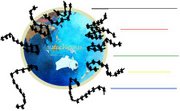Humour about Australia (February)
Use of words by Australians
Many Australians believe themselves to be direct in manner and/or admire frank and open communication. Such sentiments can lead to misunderstandings and offence being caused to people from other cultures.
For instance, spoken Australian English is generally more tolerant of offensive and/or abusive language than other variants. Many politicians are exponents of this style in Parliament. Labor Prime Minister Paul Keating called opponents "mangy maggot" and "stupid foul-mouthed grub". Mark Latham, a former Labor Leader of The Opposition referred to the Prime Minister as an "arselicker" and described a visit to see US President George W Bush as "a conga line of suckholes" heading to Washington.
Liberal Health Minister Tony Abbott called an opponent a "snivelling grub".
An important aspect of Australian English usage, inherited in large part from Britain and Ireland, is the use of deadpan humour, in which a person will make extravagant, outrageous and/or ridiculous statements in a neutral tone, and without explicitly indicating they are joking.
Another archetype is a laconic sense of irony, which can extend to nicknames given to friends and co-workers - a tall man can be nicknamed 'Shorty', or a red-haired man called 'Bluey' (although this latter example is far less common today than through to the late 1960s, as during the 1970s many Australians moved to adopt a less parochial and more international flavor to their language as part of the 'cultural cringe' which saw notions of Australian culture as being inferior to that of more developed western nations).
Australian English makes frequent use of diminutives. They can be formed in a number of ways and can be used to indicate familiarity. Some examples include arvo (afternoon), servo (service station), bottle-o (bottle-shop), barbie (barbecue), cozzie (swimming costume), footy (Australian rules football or a code of rugby) and mozzie (mosquito). Similar diminutives are commonly used for personal nicknames (Johnno, Fitzy). Occasionally a -za diminutive is used, usually for personal names where the first of multiple syllables ends in an "r", so Barry becomes Bazza and Sharon Shazza.
Many phrases once common to Australian English have become the subject of common stereotypes, over-use and Hollywood's caricaturised overexaggerations, even though they have largely disappeared from everyday use. Words being used less often include cobber, strewth, you beaut and crikey, and archetypal phrases like flat out like a lizard drinking are rarely heard without a sense of irony.
The phrase put a shrimp on the barbie is a misquotation of a phrase that became famous after being used by Paul Hogan in tourism advertisements that aired in America. Most Australians use the term prawn rather than shrimp, and do not commonly barbecue them. Many people trying to impersonate or mock an Australian will use this line, though Australians themselves would never have used this line.
Australia's unofficial national anthem Waltzing Matilda written by bush poet Banjo Paterson, contains many obsolete Australian words and phrases that appeal to a rural ideal and are understood by Australians even though they are not in common usage outside this song. One example is the title, which means travelling (particularly with a type of bed roll called a swag).






Aucun commentaire:
Enregistrer un commentaire